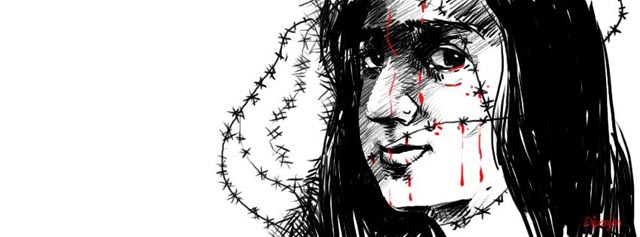Paige Reynolds | Contributing Writer
So yet again, Valentines Day is upon us. Some love it and some hate it, but perhaps you have never considered that some fear it for reasons other than being left alone in front of Bridget Jones with a tub of Ben & Jerry’s. As we all know being single can suck, and relationships also have their ups and downs, but sometimes these problems lie deeper than a bicker about where you might go for dinner tonight.
Indeed for some, the idea of celebrating their ‘loving’ relationship is a hard pill to swallow. As dark as it may sound, perhaps this Valentine’s Day should be a time to raise awareness for those who are stuck in the frightening whirlpool of an abusive or controlling relationship.
Domestic violence across the UK and Ireland is creeping into the main news channels again with both The Guardian and The Independent publishing articles related to the alarming domestic abuse statistics over the past week. The Guardian released a report on Thursday claiming that between the age of 16 – 25, 4.5% of men and a staggering 8.5% of women experience some form of domestic violence. This collided with The Independent‘s report that nearly 50% of the women who are killed by men in the UK are killed by their partners. In a national survey on domestic abuse in Ireland, almost 60% of those who had experienced severe abuse in intimate relationships first experienced it when they were under the age of 25.
On an international scale, many of last week’s SuperBowl watchers will hopefully have noticed the unsettling domestic violence awareness advert that was shown during the game as part of NFL’s ‘No More’ campaign. The most poignant recent display of the fight against domestic violence however, was the incredible phone-call trending all over social media outlets. During this 911 call a woman in need pretended she was calling a pizza delivery service and cryptically used the phone-call to inform someone she was in risk of domestic violence. For those who didn’t see this flashing up on their FaceBook newsfeed, it was an important reminder of how so many of those in danger find it so extremely difficult to reach for help.
However, fortunately, I know very few of my contemporaries who have ever been inflicted by physical violence in a relationship but this is the key misunderstanding of what the umbrella of ‘domestic abuse’ truly means.
Domestic abuse does not always start with a black eye and it certainly doesn’t have to take place at home. It is crucial that both women and men in young relationships are educated on how a relationship can spiral from attentiveness, to obsessive control and finally, to serious mental and physical abuse. You don’t need to be in a strictly domestic or physically abusive relationship to suffer the myriad of offences which fall within the bracket of domestic abuse.
A Trinity student who wishes to remain anonymous bravely relayed her experiences of a controlling relationship. ‘I knew my boyfriend cared about me more than anyone in the world, and probably would have done anything I asked him to. So even though he was manipulating me, and I cried every day, I believed it was for my best interests because he believed it was.’
She highlighted to me the importance of not vilifying the other party because ‘people who are being emotionally abused don’t think that they are, because their partner cares for them.’
Although no violence was committed, this kind of attitude between partners in a relationship is not uncommon. I am certain hundreds of girls and even some boys would undoubtedly say that there have been occasions where their partners have been forceful either verbally, emotionally or sexually in their relationship. However, often in young relationships it can be hard to call this behaviour out and to fully appreciate the difference between care and control. This type of behaviour must be better understood and criticised in the public eye for it is all too easy to see how manipulation could develop into real violence in the future.
Women’s Aid Ireland however, has just launched a campaign called ‘2in2u’ which aims to address the problem of domestic violence in its infancy. The 2in2u National Public Awareness Campaign looks to help young women to understand what it means to be in a controlling, obsessive or abusive relationship. The website provides information about how to discover the signs of dating abuse, a relationship health check test and how to protect yourself and your friends online.
Above all, it is important to remember that you don’t need a scar or a bruise to have suffered, living in fear of someones’s physical or verbal actions is grounds enough to speak out and seek help. So remember, Valentines Day maybe be a joyous and overly commercialised celebration of love for some but for others, it will merely amplify the fear and unhappiness of a relationship that seems to have no way out. It’s not a crime to be overly-attentive but if he’s too in to you, you might want to throw caution to the wind and know the difference between safe and sinister this Valentine’s Day. Look out for your friends and spread the word if you can: http://www.womensaid.ie/campaigns: http://www.2in2u.ie/







